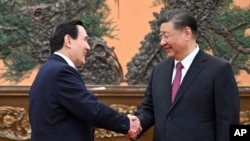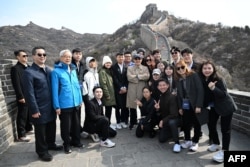Chinese leader Xi Jinping met former Taiwanese President Ma Ying-jeou at the Great Hall of the People in Beijing on Wednesday, wrapping up an 11-day “journey of peace” aimed at promoting unification between Taiwan and China.
Although unification with authoritarian China has little support in democratic Taiwan, according to public opinion polls, Ma and Xi used the meeting to promote a vision they say looks to avert conflict and highlights shared historic and cultural roots instead of differences.
Following a 15-second handshake in front of some cameras, the two sat down and delivered some brief remarks. Xi praised Ma for opposing Taiwan independence, committing to the “1992 Consensus,” which stipulates that there is only one China, and promoting peaceful development across the Taiwan Strait.
“Compatriots on both sides of the Taiwan Strait are all Chinese People,” Xi said during his opening remarks. “There is no grudge that can’t be resolved, no issue that can’t be discussed and no force can separate us.”
In response, Ma, who was Taiwan’s president from 2008 to 2016, said that while the two sides of the Taiwan Strait developed under different systems, the people all belong to the Chinese nation.
“If a war breaks out between the two sides of the Taiwan Strait, it will be an unbearable burden for the Chinese nation,” Ma said, adding that Beijing and Taipei should create a win-win situation and pursue peaceful development by seeking common ground and setting aside their differences.
The visit is the first time that a Chinese leader has hosted a former Taiwanese president in Beijing since the Kuomintang — the political party to which Ma belongs — lost in the Chinese Civil War and fled to Taiwan in 1949.
Blood ties
Through the trip, the Chinese government is trying to emphasize that cross-strait relations rest on “blood and ethnic-based nationalism,” analysts say.
Beijing wants to show that the precondition for peaceful development across the Taiwan Strait is “accepting this sort of blood and soul nationalism,” said Ja Ian Chong, an associate professor of political science at the National University of Singapore.
Chen Fang-yu, a political scientist at Soochow University in Taiwan, agrees.
“In a way, he is amplifying Chinese Communist Party’s talking points through this trip,” he told VOA by phone.
During his trip, Ma visited several cultural and historic sites and repeatedly emphasized that Taiwan and China are connected by shared cultural roots.
“Cultural exchange is a common language and emotional resonance between the two sides of the Taiwan Strait, and any attempts to decouple Chinese culture from Taiwan will not succeed because Chinese culture has a long history and is deeply rooted in the blood of the Chinese people,” he told journalists after visiting the Palace Museum in Beijing Monday.
Ma’s comments were met with mixed responses in Taiwan. Taiwan’s ruling Democratic Progressive Party, or DPP, said since Ma’s comments represent only his personal views, it respects the itinerary of his trip.
Ma’s China-friendly opposition Kuomintang, or KMT, said it hoped the meeting between Ma and Xi could continue to “promote a better foundation for cross-strait exchanges in the future.”
In addition to serving two terms as president, Ma was the former chairperson of the KMT.
According to reports in Taiwan, the current chairperson of the KMT, Eric Chu, has been invited to lead a delegation of party members for a visit to China in June. In response, the KMT said if there are any upcoming overseas trips, it would announce them in a timely manner.
Counter narratives
Ma’s meeting, which was originally scheduled for Monday but was changed at the last minute to Wednesday, comes amid a busy week of meetings in Washington. The leaders of the United States and Japan are hosting a bilateral meeting. After that, the two will be joined by the president of the Philippines for a trilateral summit on Thursday. One key driver of both meetings is the three countries’ shared concerns about China’s growing aggression in the Indo-Pacific region.
Some analysts say the timing of the Ma-Xi meeting shows it is part of Beijing’s efforts to push back against the high-profile summits.
“Beijing wants to show that it’s in a position of power in comparison to the big alliance meeting in D.C.,” Lev Nachman, a political scientist at National Chengchi University in Taiwan, told VOA by phone.
Chen at Soochow University added that Beijing wants to use Ma’s trip to reiterate its opposition to foreign interference in Taiwan-related affairs. “The Chinese government is using his trip to realize their own strategic objectives, and Ma is happy to go along with them,” he told VOA.
During his remarks on Wednesday, Xi emphasized that external forces cannot stop the historic trend of the reunion of “the family and the country.”
According to the National Chengchi University Election Study Center, support for unification as soon as possible has long been very low in Taiwan, with 1.2% supporting that option in 2023. The center has been tracking opinions since 1994, two years before Taiwan held its first direct presidential elections.
A recent Pew Research Center poll released in January found that most of those surveyed, 67%, identify as primarily Taiwanese, while 28% consider themselves primarily Taiwanese and Chinese. Some 3% consider themselves primarily Chinese.
Since the meeting also comes just weeks ahead of the inauguration of Taiwan’s new government under the pro-sovereignty DPP on May 20, Chen and Nachman said Beijing is trying to reinforce the narrative that “the KMT can bring peace to the Taiwan Strait while the DPP only wants to sabotage cross-strait relations.”
Both think Beijing’s attempt to influence Taiwanese public opinion will have limited results.
“The Chinese government’s narrative doesn’t offer enough context to assure Taiwanese voters,” Nachman told VOA.
In addition, Chen thinks Ma’s trip will not have much impact on the status of cross-strait relations.
“His trip is part of China’s overall strategy against Taiwan, where they try to offer benefits to opposition parties while continuing to unleash different kinds of threats against the ruling party,” he said.






